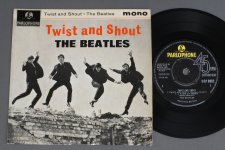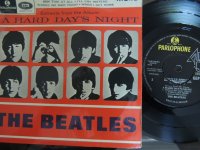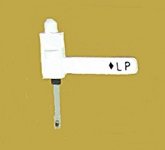I believe, Geoff, that you're thinking of the blurb that stereo LPs could be played with 'stereo compatible' mono cartridges. Although mono, these cartridges had sufficient vertical compliance so as not to damage a stereo LP.
Last edited:
Odd, I had only stereo gear since the late '50s, but then dad was an audio nut.
In recent years while buying old LPs I kept finding a surprising amount of mono versions. That led me to wonde if people in the 60s bought more mono versions, or is that's all that's left for me to find?
In recent years while buying old LPs I kept finding a surprising amount of mono versions. That led me to wonde if people in the 60s bought more mono versions, or is that's all that's left for me to find?
I feel stereo equipment at the consumer end became common only by the mid-70s, cartridge and stylus designs were popular discussion topics till 1985, when CD came...
Really, it has been so long!
More than 30 years...
Really, it has been so long!
More than 30 years...
Depends where you lived; in Oz, stereo was getting very popular in the late 60s, if you had the money. By then, stereo LPs seemed to outnumber mono in the shops, even if there were few 'hi-fi' stores. Encel Stereo was the main one here in Melbourne.I feel stereo equipment at the consumer end became common only by the mid-70s, cartridge and stylus designs were popular discussion topics till 1985, when CD came...
In 1968, my father paid what seemed the astronomical price of A$400 for a 5 watts per channel Roland receiver, a Dual auto turntable and a pair of speakers with Plessey full range drivers! But for some reason he claimed that the turntable wouldn't play Beatles or Hendrix albums...
Most of his collection comprised classical stereo LPs from Decca, Capitol and HMV, all of which had been producing stereo albums since the late 50s. It seems that stereo was the domain of the classical music fan, perhaps?
My first Beatles LP, as distinct from 45s and EPs, was "The Essential Beatles", an Oz-only release compilation from 1969. It would probably be a collector's item now but my copy got mislaid many years ago. It's never been released on CD and I can't remember the track listing.
Geoff
The average affordable units from EMI and Philips started appearing in 1974 or so, I should have the Philips leaflets somewhere.
Those were record players with small speakers forming the covers, and you could fold them up.
But at that time a proper stereo was more than two months' salary for a middle class family, so did not sell in large volumes.
It was cassette, and Japanese boom boxes that made things affordable for us.
LPs were popular, but by 1982 I could get three LPs recorded on a single cassette, and it was quite handy, in the car for example...
It was a big business then, copying songs of your choice from LP to cassette.
Those were record players with small speakers forming the covers, and you could fold them up.
But at that time a proper stereo was more than two months' salary for a middle class family, so did not sell in large volumes.
It was cassette, and Japanese boom boxes that made things affordable for us.
LPs were popular, but by 1982 I could get three LPs recorded on a single cassette, and it was quite handy, in the car for example...
It was a big business then, copying songs of your choice from LP to cassette.
That led me to wonder if people in the 60s bought more mono versions
Up to 1970, 45 rpm singles in the UK were predominately mono.
Mono was therefore the norm in the 60s UK pop music market, given that the market was singles driven.
LPs were very expensive for a working class lad like me.
I couldn't afford to buy the Please Please Me LP, so had to settle for the Twist and Shout EP instead.
I saved up for the With The Beatles album, but reverted to EPs when it came to A Hard Day's Night.
Attachments
I had the good fortune to meet Igor Popov who used to have his valve amp designs on the old Svetlana site. He left Russia at the first opportunity and ended up living in Bilbao and married an Euskadi nurse. He used to sell Russian valves and other gear and as I lived in Galicia and always travelled back to the UK flying from Bilbao I bought for myself and other WAD members a lot of Svetlana valves. We arranged an initial meeting in the Bilbao bus station, it was like a classic John le Carre film scene. He was a classic Russian, blonde hair, blue eyes. Very interesting man who had been an aerospace engineer in Russia. He left Russia with 2 of every LP the Beatles had ever made. He explained that he had bought all these LPs from Russians who worked on the huge Russian fish factory ships. The fish was bought by the Soviet government from Scots fishermen. They exchanged Russian vodka and caviar with record shop owners for LPs - all tax free deals of course. He was extremely jealous of anyone who had seen the Beatles live.
When I told him that my mother had by chance met the Beatles in a pub near the Hippodrome in Brighton, Sussex, England. She was an avid bingo nut and she had popped in to have her usual bottle of Guinness afterwards. She was actually very miffed because the Hippodrome was where she normally played Bingo and had to go to another Bingo hall. In those days, 1963 most pubs in the UK followed the classic formula - a public bar, for the working class, a lounge bar for snobs and a snug, which was for women only.
When she entered the snug she was confronted by four young men with as she put it 'funny haircuts'. She said "don't you know the snug is for women only". They all apologised in clear Scouse (Liverpool) accents and having lived for part of her childhood in Liverpool recognised the accent immediately. Telling them that she had lived in Birkenhead for some time they all said together "oh your not a real Scouser if you come from Birkenhead". They said could they buy her a drink as they had invaded a women only bar. She got her bottle of Guinness. They said, we only pooped in for a quickie but they had time to sing her a song - she still had no idea who they were or that they had finished their first set and this was their break. They sang a song just for her.
When she got home she recounted the whole event. I couldn't believe that she hadn't realised who these four young guys were. "what song did they sing you mum" - she said "I don't remember, but it was very nice". "what do you mean you don't remember". "Mum that was the Beatles" - "was it"? they were typical Scousers with Scousers sense of humour". I remember putting my hands on her shoulders - "how could you not know".
When I told this tale to Igor, he went nearly mental - "they sang a song just for her and she didn't know", it took him some time to calm down. I met Igor quite few times on subsequent visits to Bilbao and he never failed to remind me of it.
BTW - the Euskadis (wrongly called Basques) always win the yearly world competition for making the best gin and tonics - my wife totally endorses this.
When I told him that my mother had by chance met the Beatles in a pub near the Hippodrome in Brighton, Sussex, England. She was an avid bingo nut and she had popped in to have her usual bottle of Guinness afterwards. She was actually very miffed because the Hippodrome was where she normally played Bingo and had to go to another Bingo hall. In those days, 1963 most pubs in the UK followed the classic formula - a public bar, for the working class, a lounge bar for snobs and a snug, which was for women only.
When she entered the snug she was confronted by four young men with as she put it 'funny haircuts'. She said "don't you know the snug is for women only". They all apologised in clear Scouse (Liverpool) accents and having lived for part of her childhood in Liverpool recognised the accent immediately. Telling them that she had lived in Birkenhead for some time they all said together "oh your not a real Scouser if you come from Birkenhead". They said could they buy her a drink as they had invaded a women only bar. She got her bottle of Guinness. They said, we only pooped in for a quickie but they had time to sing her a song - she still had no idea who they were or that they had finished their first set and this was their break. They sang a song just for her.
When she got home she recounted the whole event. I couldn't believe that she hadn't realised who these four young guys were. "what song did they sing you mum" - she said "I don't remember, but it was very nice". "what do you mean you don't remember". "Mum that was the Beatles" - "was it"? they were typical Scousers with Scousers sense of humour". I remember putting my hands on her shoulders - "how could you not know".
When I told this tale to Igor, he went nearly mental - "they sang a song just for her and she didn't know", it took him some time to calm down. I met Igor quite few times on subsequent visits to Bilbao and he never failed to remind me of it.
BTW - the Euskadis (wrongly called Basques) always win the yearly world competition for making the best gin and tonics - my wife totally endorses this.
Galu,
spot on comment about prices. In the 60s, I remember my first pay packet was about £6 and that's the reason why I didn't start buying LPs until the 70s'. When I was 18 I remember paying 1shilling and 10 pence for my first 'legal' pint of beer - in new money that's 7 pence.
spot on comment about prices. In the 60s, I remember my first pay packet was about £6 and that's the reason why I didn't start buying LPs until the 70s'. When I was 18 I remember paying 1shilling and 10 pence for my first 'legal' pint of beer - in new money that's 7 pence.
Yes Black Stuart, during my school summer holidays I had to pick strawberries for five days just to earn enough to buy a budget, 21 shilling LP!
Regarding the mono versus stereo question:
The early UK Beatles LPs were released as both mono and stereo versions, but original stereo pressings tend to be rarer than mono ones.
For example, collectors are willing to pay five times as much for an early, mint stereo pressing of the Please Please Me LP than for a mono one.
By the end of the 1960s, stereo record players had become more common and the final two Beatles albums, Abbey Road (1969) and Let It Be (1970), were mixed and released in stereo only.
Regarding the mono versus stereo question:
The early UK Beatles LPs were released as both mono and stereo versions, but original stereo pressings tend to be rarer than mono ones.
For example, collectors are willing to pay five times as much for an early, mint stereo pressing of the Please Please Me LP than for a mono one.
By the end of the 1960s, stereo record players had become more common and the final two Beatles albums, Abbey Road (1969) and Let It Be (1970), were mixed and released in stereo only.
I used to flip the stylus back and forth on that ceramic cart wondering what "M" and "ST" stood for in our old console as a kid. I could never hear any difference since the speakers were so close together. But I can tell you without a doubt I remember how transparent and coherent the sound quality was coming from that Electrohome 6BQ5 10 watt amp ...superb. Never any..."that sounds horrible". The issue never came up. Distortion became a topic at the advent of ss. And that I do remember.
those very same old amps rival anything on the market today as far as sq is concerned. 🙃
those very same old amps rival anything on the market today as far as sq is concerned. 🙃
Last edited:
Bump on the Dutch production question. Are their CDs superior? I just bought new Beatles Anthology 1 2, and 3 from a Brit. Labels say Made In Holland. 46L, did I mess up?
btw, are CDs from Holland better than others.
Does the location of the CD pressing plant make a difference to the sound quality?
https://www.europages.co.uk/companies/Netherlands/cd pressing.html
No, It was m/st on one side and 78 on the other.
That is the question.Does the location of the CD pressing plant make a difference to the sound quality?
https://www.europages.co.uk/companies/Netherlands/cd pressing.html
No, It was m/st on one side and 78 on the other.
I see, it was the mono/stereo switch on your console to which you were referring!
P.S. I would hazard that your pressing plant question is simply a 'collectors issue'.
Isn't a 'perfect' digital master sent to the CD pressing plant? If a CD manufacturing error resulted on some zeros and ones not getting registered perfectly, surely that would be remedied by the CD player's error correction system? Or perhaps you will say that you can hear the error correction working?
Do you remember the very first CD players that had LEDs which lit up every time the error correction circuit sprang into operation?
The manufacturers soon did away with that function!
No, the flip stylus had M/ST on one side and 78 on the other. I remember my brother in law saying "oh, don't flip it to the 78 side" but he never explained why.
LP and 78 is the same as M/ST and 78.
M/ST means that the stylus can play both Mono and STereo LP records.
The larger tipped 78 stylus would possibly damage a microgroove LP record, or at least sound awful.
M/ST means that the stylus can play both Mono and STereo LP records.
The larger tipped 78 stylus would possibly damage a microgroove LP record, or at least sound awful.
I didn't know that. Good thing I only experimented to discover the difference. Soon as you admonish a 10 yr old not to do something, guess what happens. 🙂
- Home
- General Interest
- Music
- Non Remastered Beatles collection


